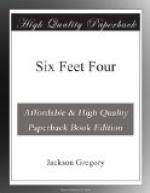Twenty yards from the door he drew rein, sitting still, frowning into the darkness. Not for the first time was he realizing that the note might not be from Clayton at all; that some other man could have known of his debt of gratitude to the little fellow who had befriended him five years ago; that the name might have been used to draw him here, alone and very far from any ears to hear, any eyes to see, what might happen. He could name a half dozen men who were not above this sort of thing, men who had, some of them, sworn to “get him.” There were the Bedloe boys, the three of them. There were two other men who do not come into this story. There was Henry Pollard.
“And it would be almighty like Pollard to put up a job like this,” he told himself grimly. “He could afford to pay a man a good little pile to get me out of the game, and keep the money I’ve paid him and get back his range besides. And I reckon the Kid would be one of a dozen who would take on the job dirt cheap!”
He reined his horse a little deeper into the shadows. Then he slipped swiftly from the saddle, one end of his thirty-feet rope in his hand, the other end about the horse’s neck, and with a quick flick of the quirt sent the animal trotting ahead to swing about and stop when the rope drew taut. He half expected his ruse to draw fire from somewhere in the darkness. Instead there came a low voice, sharp and querulous, through the open door.
“That you, Buck?”
“Yes. That you, Clayton?”
“Yes. Are you alone?”
“Yes.”
Then Thornton came on swiftly, coiling his rope as he walked. For he had recognized the voice.
“What’s the matter, Jimmie?” He was at the door now, peering in but making nothing of the blot of shadows.
“Come in,” Clayton answered. “An’ shut the door, Buck. I’ll make a light when the door’s shut.”
He stepped in, dropping his rope, and moving slowly again, his back against the wall. For after all he would not be sure of everything until there was a light, until he saw that he was alone with Clayton.
A match sputtered, making vague shadows as it was held in a cupped hand. It travelled downward to the earthen floor, found the stub of a candle, and then the greater light, poor as it was, drove out the shadows. And Thornton saw that it was Jimmie Clayton, that the man was alone, and that evidently his note had put it mildly when he had said that he had struck “hard luck.”
The man, small, slight and nervous looking, lay upon a bed of boughs, covered with an old saddle blanket, his eyes bright as though with fever or fear. The skin of his face where it was seen through the black stubble of beard looked yellow with sickness. The cheek bones stood out sharply, little pools of shadow emphasizing the hollowness of his sunken cheeks. Above the waist he was stripped to his undershirt; a rude bandage under the shirt was stained the reddish brown of dried blood. A quick pity drove the distrust out of the eyes of the man who saw and who remembered.




